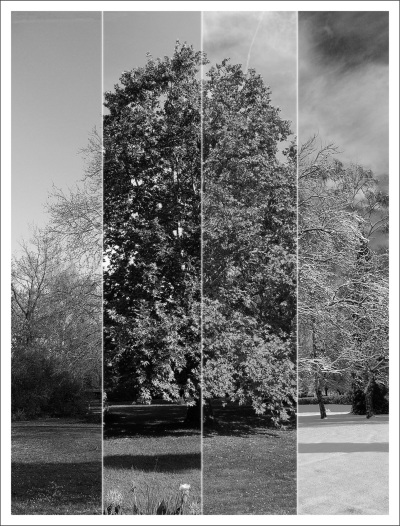 In the springtime, people walk outside and say that love, life, or some other abstract concept is floating around in the air. You can take a giant sniff and notice it; it permeates the air we breath like a fragrance, or a pheromone.
In the springtime, people walk outside and say that love, life, or some other abstract concept is floating around in the air. You can take a giant sniff and notice it; it permeates the air we breath like a fragrance, or a pheromone.
So it logically follows that in the autumn, the thing you smell floating around is something—at its core—fundamentally the opposite of love, life, etc. In other words, “death is in the air.”
This really isn’t as morbid as it sounds. In fact, death is just a representation of the ultimate change, a break from life, which is to us a constant. So really, change could be what’s floating around in the air if that makes you more comfortable.
Either way, there is something about autumn that is different; something less vibrant, less youthful. Fall is sort of like a tired old woman at the end of her days, sitting at home and knitting mittens for all of her loved ones to keep them warm in the coming winter. It seems as if everyone is sensitive to it, sensing something that they can’t quite put a name to, but which is inevitably happening with every passing day.
If you don’t believe me, maybe you’ll believe the ancient Chinese tradition of seasons and cycles of life. They believe that every season corresponds with a phase of life, and that all living things experience these phases physically and spiritually many times throughout their lives.
Spring, of course, represents a new beginning, growth, and birth. That is pretty widely accepted. Summer is when all of these things mature and grow into the prime of their lives. Late summer represents the late phase of life, what we equal in “human terms” as middle aged or in the golden years of someone’s life. Then comes autumn, which represents the actual death or passing away of these things. Finally, winter is the final resting phase before more new things come to life in spring again.
It really does make sense. There are a number of things that die in the fall. Trees change colors and leaves fall, drying out and decomposing into the ground. Farms reap their last harvests, cutting away the final living plants from their life source before the field becomes dormant for the winter. Even the light dies as the days become shorter and shorter, the earth moving away from the sun, the first of many days of darkness to come as we shift into winter.
The point is that autumn is a great change for the earth, as well as for all of us. And you know how we humans like our change to be, nonexistent.
But change is inevitable, unstoppable, blah blah blah.
The fact is that most of us here are on the cusp of an imminent change. The catalyst for that change is that place many of us call home, or at least the proverbial couch we crash on for a night or two: it’s college, Gustavus, or really any other university, state college, or technical school.
College is a factor that we think we can control, a tool that we try to use to determine the rest of our lives, what we will do and how we will live. It’s where we define ourselves, other people, and basically everything and anything else under the sun.
It’s a pivotal time in all of our lives, the ends and beginnings of great things. But there is only one problem with this thought process: Change is uncontrollable, even to us, the authors of our own lives.
Just as the season changes without our permission, so do changes occur unexpectedly, ill timed, and unfairly in our life. The unpredictable forces of change blow away any kind of upper hand we think we might have. Sure, we may invent things like the autumnal equinox and pretend that it is a marker for the start of fall, but it doesn’t mean that we really have any say in when the season will start changing, or when it will end. Everyone and their mother knows that, especially in respect to the Minnesotan winter.
This is something equally easy to forget and remember at this time of the year. And since there’s no escaping it, the best way you can conduct your life is try to accept the all-powerful force of change in our lives, the lack of control we really have over it, the tears and fits of anger it will indubitably cause, but also the wisdom we can gain from changes. After all, Mother Nature knows her stuff, so you best be wising up.
Maybe then the scent of death in the air might smell sweeter. Or maybe that’s just a bad analogy.
-Ashley Nickel
